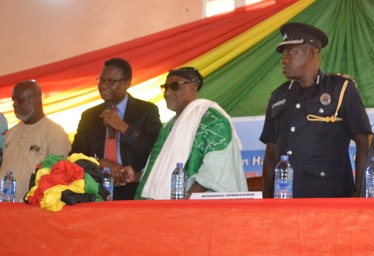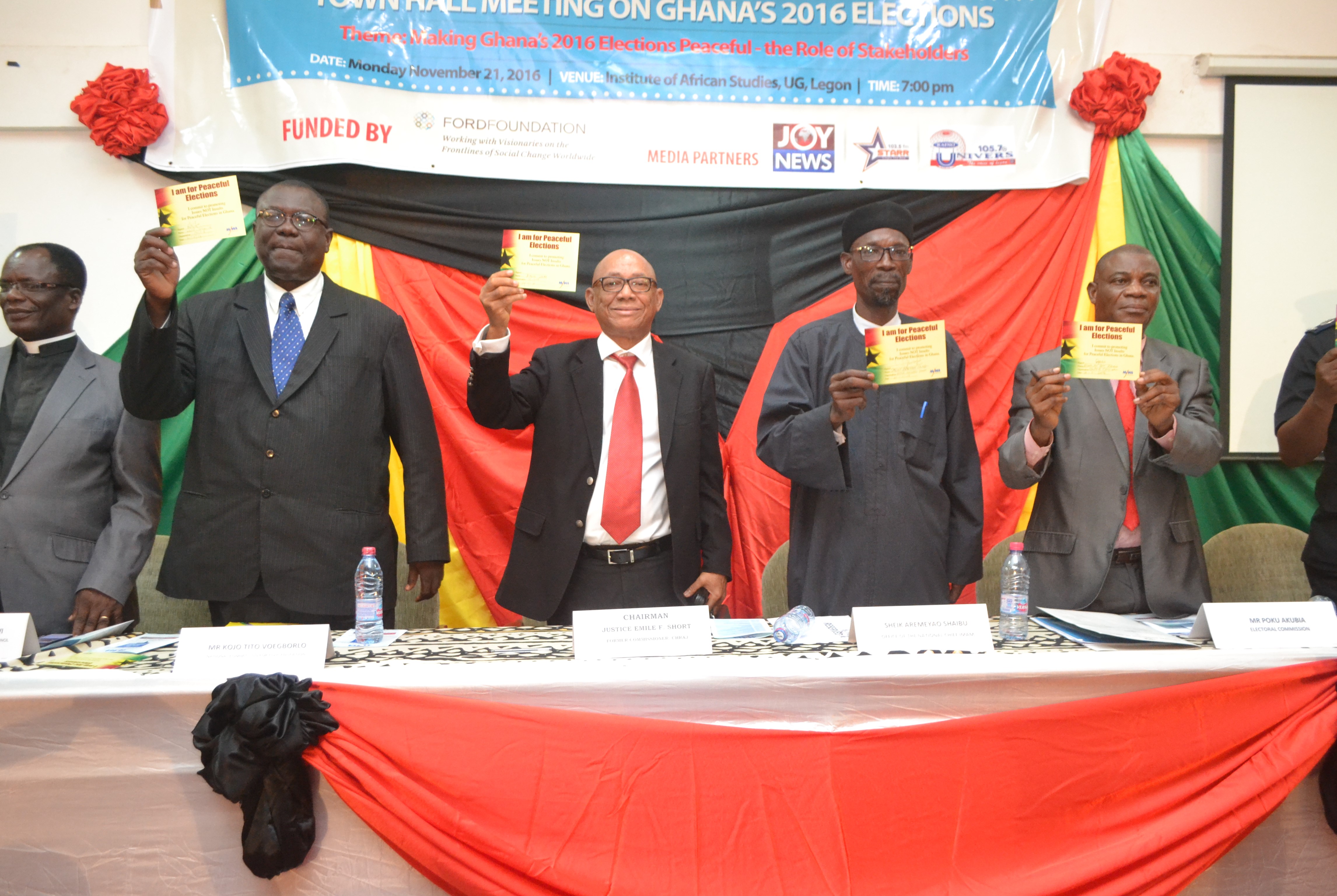The Electoral Commission of Ghana, Ghana Police Service, Political Parties and other stakeholders such as traditional and religious leaders have assured Ghanaians that the 2016 elections will be peaceful, credible and acceptable to all.
These critical institutions made the assurances at three Town Hall Meetings organised in the Northern, Ashanti and Greater Accra regions by the Media Foundation for West Africa (MFWA).
The Town Hall Meetings were organised as part of the MFWA’s elections project titled, Promoting Issues-based and Decent Language Campaigning for Peaceful Elections in Ghana in 2016. The meetings in Tamale and Kumasi were chaired by Prof. Emmanuel Asante, Chairman of the National Peace Council, and the Accra Meeting was chaired by Justice Emile Francis Short, former Commissioner of the Commission for Human Rights and Administrative Justice (CHRAJ).
Under the theme, Making Ghana’s 2016 Elections Peaceful – the Role of Stakeholders, the Town Hall Meetings brought together key institutions and individuals in the electoral process to discuss and agree on how to ensure that the 2016 elections are conducted in a peaceful manner.
Specifically, participants at the Town Hall Meetings included, the leadership and representatives of the Electoral Commission of Ghana (EC), the Ghana Police Service, Political Parties, Traditional and Religious Leaders, the National Commission for Civic Education (NCCE), media and communications experts, academics, students, civil society organisations, media and the general public.

In all the three regions, the EC and Ghana Police Service highlighted the interventions they have put in place to ensure that the elections are credible and peaceful. The police service specifically allayed fears of the public about the suspicion of possible eruption of violence in some hotspots in the country. The NCCE, traditional and religious leaders also made known the educational and sensitisation programmes they have rolled out to inform the electorate on the electoral processes and their civic roles in ensuring that the elections are peaceful. The media and communications experts also consistently reiterated the media’s crucial role in promoting peaceful elections before, during and after the elections.
For their part, political parties pledged their commitment to peaceful elections. They also called on their supporters to be law-abiding throughout the electoral process. They, however, cautioned the EC and the Police Service and the National Peace Council to play their watchdog roles carefully and fairly to safeguard the peace of the country.
At the end of each of the three Town Hall Meetings, participants signed pledge cards and took group photographs with the cards as public evidence of their commitment to peaceful elections.
Below are highlights of the specific interventions outlined by the EC, Police Service, NCCE, traditional and religious leaders to contribute to peaceful and credible elections:
The Electoral Commission of Ghana (EC)
- Recruitment of polling officers with advanced educational knowledge through a vigorous and open process
- Increase in the number of polling stations to avoid congestion
- Setup of Regional and Constituency Collation Centres furnished with projectors
- Provision of additional verification machine at every polling station as a standby measure in the event that any of the machines go faulty
- Election officials to take an oath before magistrates to make them liable for prosecution upon default
- Verification machines that will be used in the elections will be in good shape to ensure that no registered voter is disenfranchised
The Ghana Police Service
- Increase in the capacity of police personnel to man polling stations in the country on election day
- A 24-hour police patrol in some hot spots in the country to quickly respond to potential threats of violence
- A 24-hour help line for citizens to call for police assistance where activities of some individuals risk the peace of the elections
- Arrest and prosecution of troublemakers at polling stations
- Arrest and prosecution of any un-authorised group that may cause fear and panic at election centres
The National Commission for Civic Education (NCCE)
- Vigorous effort in educating first time voters on the voting process
- A community-to-community-based approached in getting local indigenes to know the voting procedure as well as the Dos and Don’ts of election
- Engagements with indigenes in specific localities on how to conduct themselves in a manner that will not create tensions during the elections
Political Parties
- Commitment to peaceful elections in 2016 elections – to ensure that the peace that the citizenry is enjoying is sustained even after the elections
- Encouragement of supporters to be law abiding throughout the electoral process
The Traditional and Religious bodies
- Engagements with the youth to discourage them from resorting to violence that may derail the peace in the country
- Use of all worship days (in churches and at mosques and all religious gatherings) to preach the message of peace to their congregants
As we go to the polls, the Media Foundation for West Africa wishes to commend all stakeholders for their active participation and assurances of peace at all the Town Hall Meetings. The MFWA urges all stakeholders to demonstrate commitment to the assurances made on these platforms to ensure that the December polls are peaceful, free and acceptable to all.
With funding support from:






